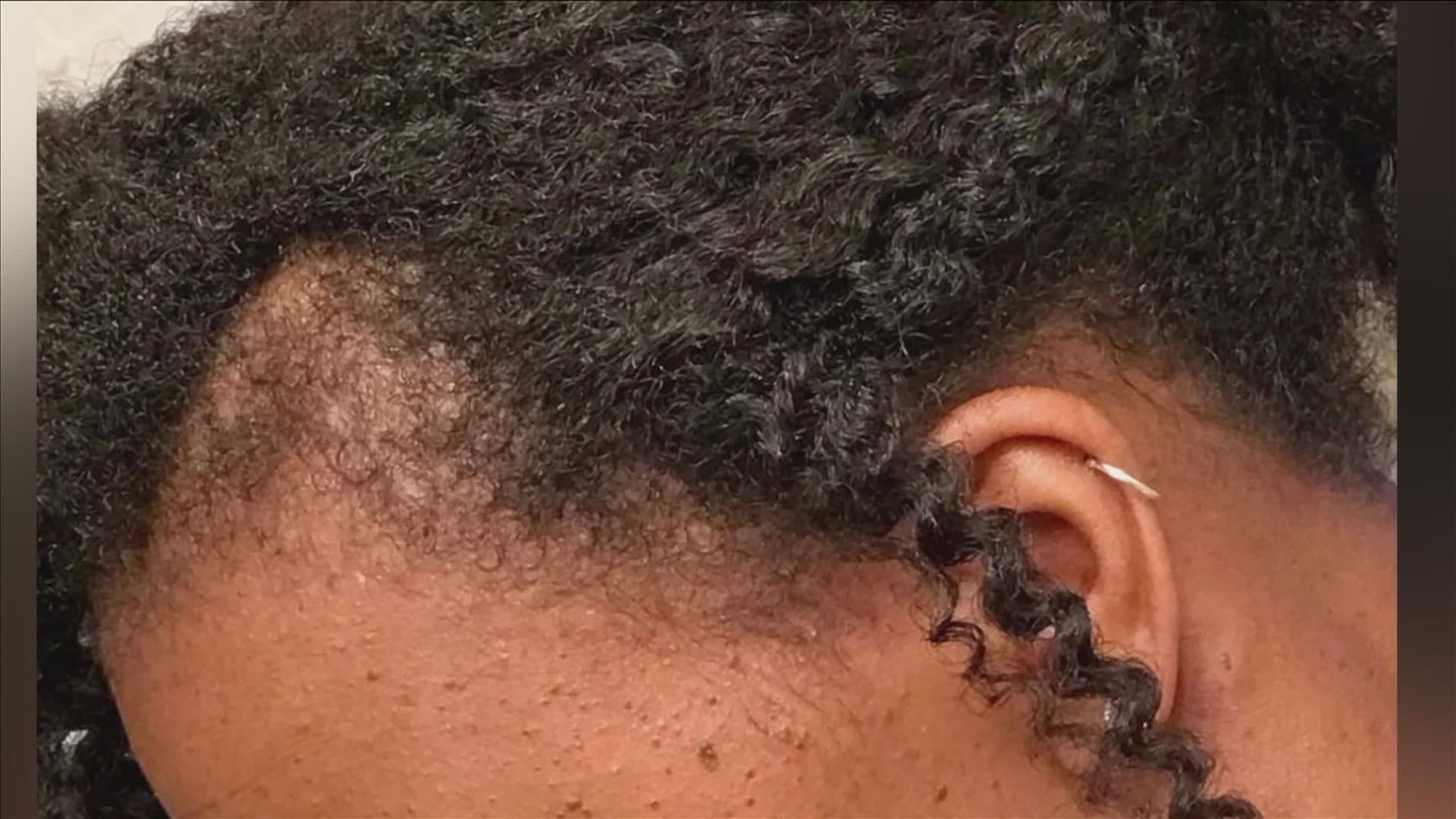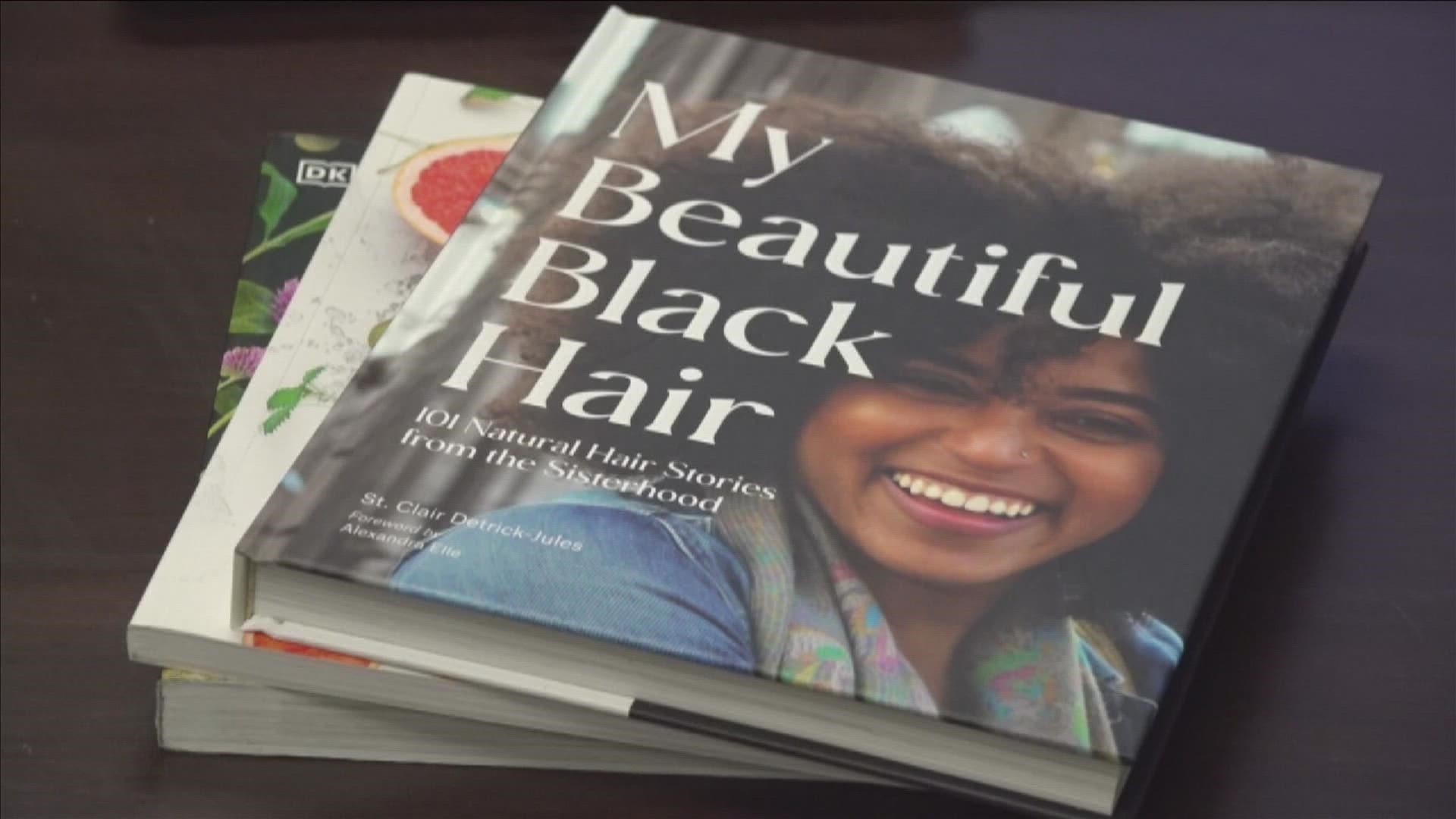MEMPHIS, Tenn. — For many, our hair is our pride and joy.
It can be a symbol of personal style or a collective culture.
But what is healthy hair?
There is something to be said about the way we wear our hair. Whether it’s straight, curly, or in braids and twists, it is what makes us uniquely us.
There is a lot of care that goes into our hair, and we’re sitting down with a specialist in a two-part story to help you achieve healthy hair.
You are what you eat.
“I have lavender here, sage, rosemary,” said Samaria Grandberry, a dietician and trichologist.
The roots we consume are the roots we produce.
“Your body builds itself based off what you eat,” said Grandberry.
All parts of your body are affected, even down to the most visible part of you - which is your hair.
It is our crown, our mane, and our strut of confidence.
“Everyone is an individual. We might look similar on the outside. Our hair might look similar on the outside, but we all have different needs,” said Grandberry.
No one understands those needs more than her. Grandberry is a dietician and trichologist.
“Trichology is a paramedical science that studies disorders of the hair and scalp. It’s not an artistic science like cosmetology. It’s not a medical science like a medical doctor, like a dermatologist. It’s right in the middle. We use a scientific holistic approach,” said Grandberry.
That holistic approach led Grandberry on her own hair journey. It was a test of patience and self-care.
“I had COVID in December... My body was under attack. I had fever. In January, I had my hair done by a celebrity stylist. It was someone who wasn’t familiar with my hair,” said Grandberry.
Months later, Grandberry started experiencing hair loss.
“I noticed lots of hair coming out, a lot of hair like around my edges coming out,” said Grandberry. “It’s still scary, you know, when your hair comes out especially as a woman. Even knowing what to do, it’s still... I was trying to fight back the tears. Every day I look in the mirror waiting for it to grow back.”
Holding back her feelings, Grandberry understood what her body and hair were doing.
“It diverted energy to heal me and make sure I got better versus putting it to my hair. That divergent of energy, that immune attack, disrupts the hair cycle and causes the hair loss six to 16 weeks later,” said Grandberry.
She was able to pinpoint exactly what caused her hair loss.
Grandberry said when we have body changes such as diet, medication, stress, or even use certain hair products, we don’t often see the effects on our hair immediately. It can show up, even up to three months later.
“It’s because your hair isn’t vital to live. Your hair is normally the last thing to get nutrients and one of the first things to leave if you don’t have those nutrients,” said Grandberry.
That is why what you eat is so important, especially since hair cells regenerate quickly.
“If you aren’t getting the most optimal amount of nutrients, your body is not going to prioritize your hair. It’s going to prioritize your heart, your liver, make sure you live and breathe and not necessarily look the best,” said Grandberry. “I use different approaches to help women get to the root of their beauty and hair loss issues... What I do is help women feel more confident in their hair, helping them take up space and show up with their natural hair.”
Everyone’s hair is different even down to the hair strands. Grandberry explained how the hair cycle works.
“There’s three parts to a hair cycle. There’s the antigen which is the growing phase. It is the catagen phase which is the resting phase. It just kind of rest there. Then, there’s the telogen phase is when it all comes out. There’s a cycle that’s always happening on your scalp. Different hair strains are in different phases,” said Grandberry.
What we eat, changes in our diet, medications, and different hair products can disrupt the hair cycle.
“With people who go on low calorie diets, low carbohydrate diets that are feeding their hair, they might notice some hair loss because the hair requires a lot a lot of energy. It’s a very fast-growing cell. Because it’s not necessary, it’s not going to get the first amount of energy.”
The tell-tale sign as to where those strands are in their cycle is the scalp.
“The scalp can tell me a lot about someone’s hormonal stage or their nervous system, even their regimen,” said Samaria.
In a method called a trichoscopy, Grandberry uses a microscope to look at patients’ hair follicles and scalp.
“Healthy hair grows from a healthy scalp. I start working on the scalp first making sure that this environment is clean, that it’s hydrated and not red or inflamed,” said Grandberry.
For her clients, Grandberry often recommends getting more nutrition from foods first to heal the scalp and hair.
“Foods have a good balance of nutrients whereas taking sole supplement, sole vitamins, can cause other imbalances in your body,” said Grandberry.
Often women, particularly Black women, are advised to take supplements first.
“For Black women, a lot of times, our hair is just misunderstood. There’s a lot of blankets statements out there like, ‘Take this. Use this. Use this oil,’” said Grandberry.
Instead, she said nature has all you need.
“Lavender is very calming to the scalp,” said Grandberry. “Rosemary has actually been shown to stimulate hair growth in a lot of clinical trials... I’ll make teas or tinctures to help them with their healing process with their hair.”
Using tea rinses with natural herbs, Grandberry works to decrease bacteria in the hair and scalp to stimulate growth.
“We’re attacking things from the inside and the outside... I get a lot of complaints about dry hair and dry scalp. One of the things a lot of people do is put oil on it, but I always say, ‘When was the last time you drank oil when you were thirsty?’ Water is the only hydrator,” said Grandberry. “Drink more water and use more water on your scalp. That is the main way your hair will be hydrated, and you can combat that dry scalp.”
Sometimes, it is not always what we eat, but life’s stressors that cause hair loss or breakage especially for women.
“Stress and lack of self-care can be a major hit on the hair. It can disrupt the hair cycle. Taking care of other people and doing this and that, not focusing on our health, our peace and nutrition can really long-term cause poor effects on our health and our hair,” said Grandberry.
There are also social factors and ideas for what is acceptable hair. It often impacts Black women.
“A lot of things we’ve faced like discrimination or the challenges of finding stylist or finding people who understand our hair, going to doctors who aren’t afraid to touch our hair,” said Grandberry. “It’s hard to put a standard on it, put a standard on what healthy hair is supposed to look like. It’s supposed to shiny, long, thick, and loosely curled. Those extremely unrealistic standards for some people have forced them down this path that has caused their hair loss.”
That leads to the million-dollar question. What is healthy hair?
“Healthy hair is whatever feels good for you,” said Grandberry. “It’s up to each person to figure out what is healthy hair for them. Once you give your hair all that it needs, all the nutrition, the good regiment, all of that, what is the healthiest hair you can achieve for you and not anybody else?”
If you’re interested in learning more about healthy hair, click here.


